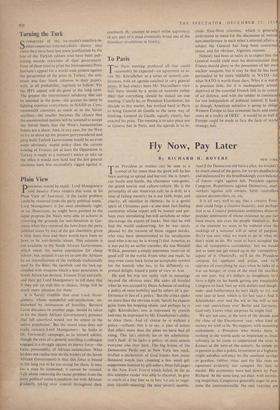To Paris
T1113. Paris meeting produced all that could reasonably be expected—an agreement to in- vite Mr. Khrushchev to a series of summit con- ferences, with an agenda couched in very general terms. It had always been Mr. Macmillan's view that there should be a series of summits rather than' that everything should be staked on one meeting. Clearly he, or President Eisenhower, his disciple in this matter, has worked hard in Paris to bring General de Gaulle to the same way of thinking. General de Gaulle, equally clearly, has exacted his price. The meeting is to take place not in Geneva but in Paris, and the agenda is to in-
elude 'East-West relations,' which is generall understood to stand for the discussion of mutua non-interference in each other's internal affairs, a subject the General has long been concerned about, and for obvious, Algerian, reasons.
Nobody had been so naïve as to expect that the General would yield over his determination tha France should glory in the possession of her own nuclear weapons, but it ma Y be that he has been persuaded to be more biddable in NATO—for what NATO is worth these days. What it is worth is precious little, for it is inadequately armed, deprived of the essential French link in its system of air defence, and with the soldier in command far too independent of political control. It looks as though American initiative is going to oblige Western Europe to face economic facts, and make more of a reality of OEEC: it would be as well if Europe could be made to face the facts of world Strategy, too.


























 Previous page
Previous page